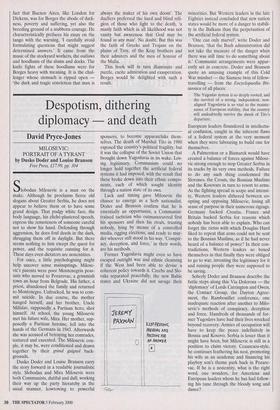Despotism, dithering
diplomacy and death
David Pryce-Jones
MILOSEVIC: PORTRAIT OF A TYRANT by Dusko Doder and Louise Branson Free Press, £17.99, pp. 304 Slobodan Milosevic is a man on the make. Although he proclaims fierce old slogans about Greater Serbia, he does not appear to believe them or to have some grand design. That pudgy white face, the body language, his cliché-plastered speech, express the remoteness of someone careful not to show his hand. Defending through aggression, he does foul deeds in the dark, shrugging them off in daylight. But there seems nothing to him except the quest for power, and the requisite cunning for it. These days even dictators are nonentities.
For once, a little psychologising might help uncover some mainsprings. Milose- vic's parents were poor Montenegrin peas- ants who moved to Pozarevac, a grimmish town an hour from Belgrade. His father, a priest, abandoned the family and returned to Montenegro. Unfrocked, he was to com- mit suicide. In due course, the mother hanged herself, and her brother, Uncle Milislav, supposedly a Partisan hero, shot himself. At school, the young Milosevic met his future wife, Mira. Her mother, sup- posedly a Partisan heroine, fell into the hands of the Germans in 1943. Afterwards she was accused of betraying her comrades, tortured and executed. The Milosevic cou- ple, it may be, were conditioned and drawn together by their grand guignol back- grounds.
Dusko Doder and Louise Branson carry the story forward in a readable journalistic style. Slobodan and Mira Milosevic were both Communists, dutiful and dull, working their way up the party hierarchy in the usual manner, kowtowing to powerful sponsors, to become apparatchiks them- selves. The death of Marshal Tito in 1980 exposed the country's political fragility, but it was the collapse of the Soviet Union that brought down Yugoslavia in its wake. Los- ing legitimacy, Communism could no longer hold together the artificial federal systems it had imposed, with the result that these broke down into their ethnic compo- nents, each of which sought identity through a nation state of its own.
Luck and timing gave Milosevic the chance to emerge as a Serb nationalist. Doder and Branson confirm that he is essentially an opportunist, a Communist- trained tactician who outmanoeuvred first his sponsors and then his rivals, trusting nobody, lying by means of a controlled media, rigging elections, and ready to mur- der whoever still stood in his way. 'Conspir- acy, deception, and force,' in their words, are his methods.
Former Yugoslavia might even so have escaped outright war and ethnic cleansing if the West had been able to devise a coherent policy towards it. Czechs and Slo- vaks separated peacefully; the new Baltic states and Ukraine did not savage their minorities. But Western leaders in the late Eighties instead concluded that new nation states would be more of a danger to stabili- ty in the Balkans than the perpetuation of the artificial federal system.
'One can only marvel', write Doder and Branson, 'that the Bush administration did not take the measure of the danger when there was still time to do something about it.' Communist arrangements were appar- ently set in concrete. Doder and Branson quote an amusing example of this Cold War mindset — the Siamese twin of fellow- travelling — from the Encyclopaedia Bri- tannica of all places:
The Yugoslav system is so deeply rooted, and the survival of a strong, independent, non- aligned Yugoslavia is so vital to the mainte- nance of European stability, that the country will undoubtedly survive the shock of Tito's departure.
European leaders floundered in intellectu- al confusion, caught in the inherent flaws of a federal system at the very moment when they were labouring to build one for themselves.
A Palmerston or a Bismarck would have created a balance of forces against Milose- vic strong enough to stop Greater Serbia in its tracks by its very own methods. Failure to do any such thing condemned the Slovenes, the Croats, the Bosnian Muslims and the Kosovars in turn to resort to arms. As the fighting spread in scope and intensi- ty, Western leaders dithered between co- opting and opposing Milosevic, losing all sense of purpose in their numerous zigzags. Germany backed Croatia. France and Britain backed Serbia for reasons which nobody has been able to explain. Who can forget the rictus with which Douglas Hurd liked to repeat that arms could not be sent to the Bosnian Muslims, as if he had never heard of a balance of power? In their con- tradictions, Western leaders so boxed themselves in that finally they were obliged to go to war, inventing the legitimacy for it and ruining people they were supposed to be saving.
Soberly Doder and Branson describe the futile steps along this Via Dolorosa — the 'diplomacy' of Lords Carrington and Owen, the Contact Group, the Dayton Agree- ment, the Rambouillet conference, one inadequate reaction after another to Milo- sevic's methods of conspiracy, deception and force. Hundreds of thousands of for- mer Yugoslays have had their lives wrecked beyond recovery. Armies of occupation will have to keep the peace indefinitely in Bosnia and Kosovo. Serbia is lesser than it might have been, but Milosevic is still in a position to claim victory. Ceausescu-style, he continues feathering his nest, promoting his wife as an academic and financing his playboy son's theme park back in Pozare- vac. If he is a nonentity, what is the right word, one wonders, for American and European leaders whom he has had follow- ing his tune through the bloody song and dance?


























































 Previous page
Previous page